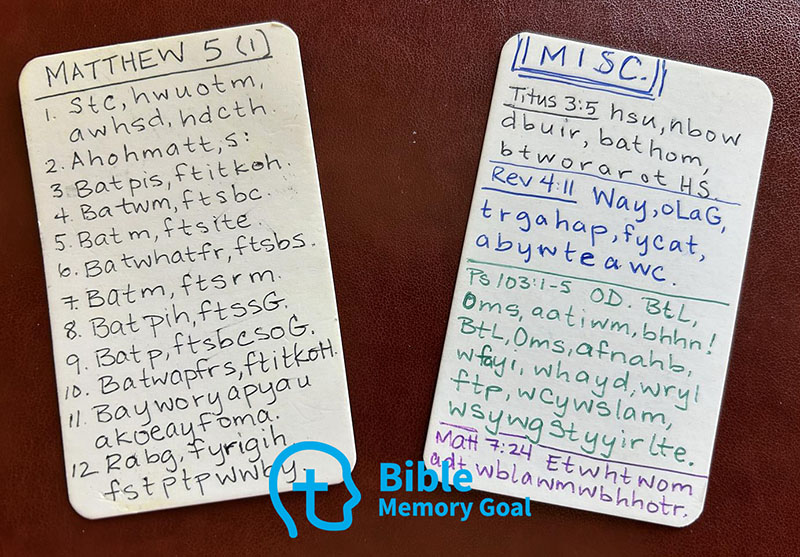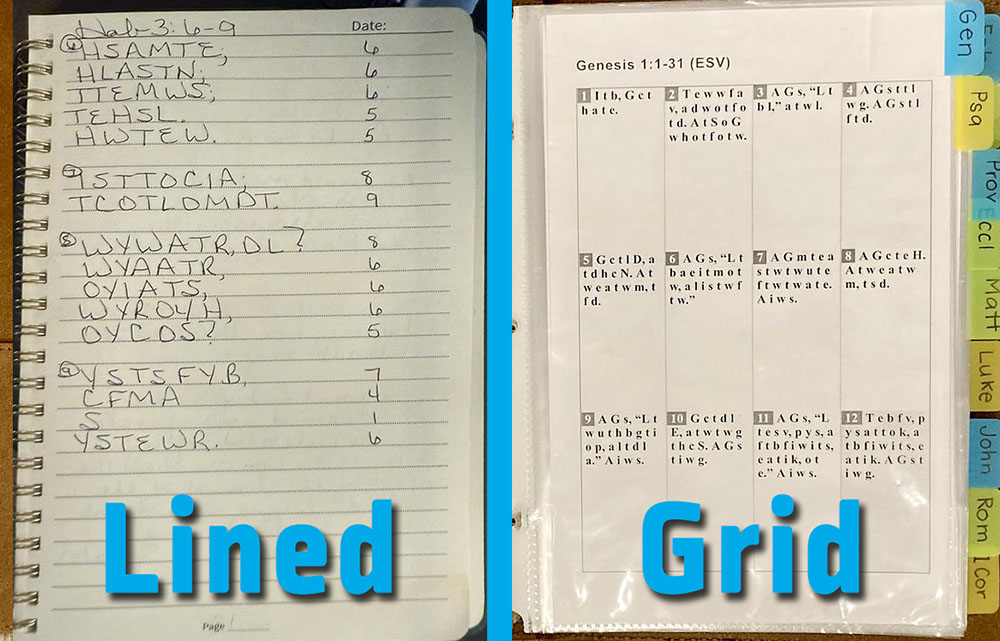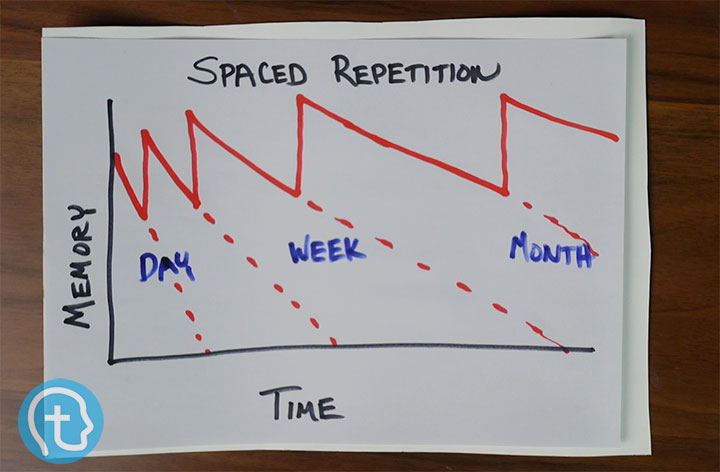Whether you’re looking to memorize your very first chapter or aiming to internalize an entire book of the Bible, this simple 7-step process is designed to eliminate mental roadblocks and invite you into a deeply rewarding spiritual journey.
Memorizing God’s Word is worth every moment of effort, and I can personally guarantee—God will meet you in the process.
This process may seem daunting, which is why breaking it down into a 7-step process is so important. You can download a PDF sheet you can print out below, or scroll down to continue reading.
- Start with Why
- Choose Your Passage
- Start Big, then Go Small
- Memorize: Write, Remark, Record
- Break it Down
- Prepare for Review
- Celebrate Your Wins
1. Start with Why
Before you even open your Bible to a specific chapter or verse, take a step back and ask yourself:
“Why do I want to memorize Scripture?”
This may feel unnecessary or overly philosophical, but having a clear sense of purpose is vital to sustaining long-term motivation.

In the beginning, you might feel energized and excited about memorization. But that feeling won’t last forever. You’ll face days when the words feel dry, your brain feels foggy, or life’s distractions compete for your attention. During those times, your “why” is what keeps you going.
A vague answer like “to hide God’s Word in my heart” is noble but insufficient.
Dig deeper.
- Do you want to know God more intimately?
- Do you want to be able to pray with Scripture?
- Do you want to internalize truth to combat lies in moments of temptation?
All of these are powerful motivations, but you need to know which one resonates most with you.
Personally, I began this journey after a traumatic experience—being detained in a foreign country and stripped of my Bible. That drove me to internalize the New Testament, and I’ve now memorized 12 book so far. My “why” fuels me every day.
Take Action
Grab a journal and write a one-sentence statement that clearly answers, “Why do I want to memorize Scripture?”
2. Choose Your Passage
Once your motivation is solid, the next step is to choose the passage of Scripture you want to memorize. And this decision can either set you up for success or create unnecessary frustration.

Here’s an important tip to consider: start small.
Familiar psalms like Psalm 1 or Psalm 23 are excellent for beginners. They’re rich with meaning, relatively short, and provide what I call an “easy win.” My first full book memorized was Philemon—just 25 verses in one chapter. But that small victory proved to me that memorizing an entire book was possible.
When deciding which passage of Scripture to memorize, consider:
- What are you studying or reading during your quiet time?
- What is the current sermon series at your church?
If your pastor is preaching through James, consider memorizing along with the sermon series. This adds both relevance and built-in review, as you’re regularly engaging with the text.
Here’s another key tip: Not every verse you memorize will feel powerful in the moment. Some may feel mundane or confusing. That’s okay. Memorizing an entire passage gives you context that isolated verses lack. You begin to see how the arguments develop, how the tone shifts, and how the themes connect. This builds a much deeper understanding of the Bible as a whole.
Take Action
Choose a chapter or book based on your personal interest, current study, or spiritual needs. If you’re not sure where to start, choose something short and impactful.
3. Go Big, then Go Small
Now that you’ve chosen your passage, you might be tempted to start memorizing line-by-line. But hold up! One of the best things you can do first is to step back and gain a bird’s eye view of the entire passage.
Start big. Then go small.

The goal here is comprehension, not just memorization. Read your chosen passage every day for at least a week—ideally two or more. Whether it’s a single chapter or the book of Philippians, read it in one sitting.
Don’t worry about memorizing yet. Just absorb the flow, tone, structure, and progression of thought.
Why does this matter?
Because without seeing the “forest,” you can easily get lost in the “trees.” You may remember words but miss the point. Understanding the big picture gives meaning to the smaller parts of the passage of Scripture that you’re internalizing. It helps you know where you are in the passage and allows you to anticipate what’s coming next—both of which aid memorization.
As you read through the passage, ask yourself:
- What are the key themes of this passage?
- Are there natural breaks or shifts in argument?
- Is the tone comforting, instructional, urgent, or poetic?
Recognizing these patterns will anchor your memory and make each section more memorable.
Take Action
Set aside time for the next 2-4 weeks to read the entire passage aloud once a day. Take notes on any recurring phrases, shifts in thought, or emotional tone. This step lays the groundwork for everything that follows.
4. Memorize! Write, Remark, Record
Now we begin the active memorization process—and this is where it gets fun! To make your memory stick, we’ll engage multiple senses with the “write, remark, record” method.

There are numerous methods for memorization, but no matter which technique you end up using, I always recommend taking these three steps:
Write Out the Passage
Start by writing out the passage. It may feel unnecessary, but it’s a big part of memorization. You can do this in two ways:
- Write the entire passage by hand. The physical act of writing forces your brain to slow down and process each word.
- Or, if you’re short on time, write out the first letter of each word from a verse—one verse per line. This method, which is one of the best Bible memory methods, helps cue recall without relying entirely on repetition.
If you don’t have time to write it out, you can have it printed or photo copy the page in your Bible, but this should be a last resort.
Remark on the Written Page
Next, mark up your written page. Every person can add their own personality here, but here are some ideas:
- Highlight key phrases;
- Underline repeated words;
- Circle hard-to-remember transitions;
- Color a specific word or phrase you struggle to remember in a bold color or add a sticky note reminder.
This creates a visual roadmap of the text. Over time, your marked-up paper becomes a cheat sheet for your mind.
Record an Audio File
Finally, use your phone to record yourself reading the passage aloud.
Don’t forget: Read with emotion!
This isn’t a dry recitation—it’s God’s Word. Your voice becomes an auditory anchor, and you’ll be amazed how well you remember the cadence and rhythm of your own recording. Later, you can listen while driving, walking, or washing dishes—turning idle moments into powerful review opportunities.
Take Action
Choose one or more of these techniques and use them for the first section of your passage. You’ll not only memorize faster, but you’ll also deepen your understanding and enjoyment of the Scripture.
5. Break it Down
Long passages can feel overwhelming, even intimidating. The key is to break the text into manageable pieces—mentally, emotionally, and practically.

Think of it like hiking a long trail. You don’t focus on the entire mountain. You focus on the next bend in the path.
Likewise, divide your passage into logical sections—5 to 7 verses is a good target. These often align with complete thoughts, arguments, or shifts in tone. Chapter divisions can be helpful, but don’t feel bound by them.
You can memorize one verse per day and finish a section each week. That sense of forward movement builds confidence and momentum.
This approach also helps you avoid burnout. Smaller chunks reduce cognitive load, improve retention, and make review more efficient. Once you complete a section, review it as a whole before adding the next. This layering effect reinforces memory and reduces the risk of forgetting what you’ve already learned.
Take Action
Divide your chosen passage into smaller sections. Write these section headers on index cards or in a notebook, and tackle them one at a time. Build momentum slowly and steadily.
6. Prepare for Review
Here’s where most people stumble. They memorize a passage, feel proud of their accomplishment… and then forget it within weeks. Why? Because they don’t have a plan for review.
Review is where short-term memory becomes long-term knowledge. And the most effective method for this is called spaced repetition—a scientifically proven way to retain information by reviewing it at increasing intervals.

Here’s how it works in Bible memory: Review new verses daily. Once you feel confident, reduce review to every 2–3 days, then once a week. Over time, you’ll move the passage into long-term memory with less and less effort.
To do this well, you’ll need a Bible memory review system. Some use Bible memory apps, others prefer spreadsheets, notebooks, or index cards. Whatever tool you use, schedule your review intentionally. Tie it to a daily routine like your commute, a walk with the dog, or even brushing your teeth.
Your earlier tools—your written pages, highlighted notes, and voice recordings—will come in handy here. Revisit those aids when verses feel rusty. Don’t get discouraged by forgetting; repetition is part of the process.
Take Action
Choose a system for review—whether it’s digital, analog, or a hybrid—and stick to it. The goal is consistency, not perfection. Even five minutes a day can make a massive difference.
7. Celebrate your Wins!
Memorizing Scripture is hard work—and like any good habit, it deserves celebration! Don’t skip this step. Marking your progress with intentional reward reinforces the joy and value of the process.

Celebration isn’t about boasting. It’s about giving God glory and building a habit loop in your brain that associates Scripture memory with positive reinforcement. This could be as simple as sharing a recitation with your family and then going out for a special meal. Or reciting a chapter to your small group and grabbing coffee afterward.
You don’t need to memorize alone, either. In our online Bible memory community, people from around the world share videos of the passages they’ve memorized. We cheer each other on, celebrate milestones, and build one another up in love and truth.
These celebrations also set an example for your kids, friends, and church. When they see you honor the spiritual discipline of memory—not by bragging, but by rejoicing in it—they may be inspired to join you.
Take Action
Plan your next celebration. Will you record a video? Recite a chapter to your spouse? Share a verse with your pastor? Don’t just finish a passage and move on. Take a moment to honor the journey.
What’s Next?
So what’s your next move? Don’t just read this and walk away. Take action today. Download the 7-Step Checklist for free and then:
- Write down your “why.”
- Choose a chapter or book to memorize.
- Leave a comment below with what you picked—I’d love to know!
Your Bible memory journey is just beginning, and it’s one of the most life-giving pursuits you’ll ever take on. Let’s walk this path together.
Follow along with all the Bible Memory Goal YouTube videos!



Leave a Reply